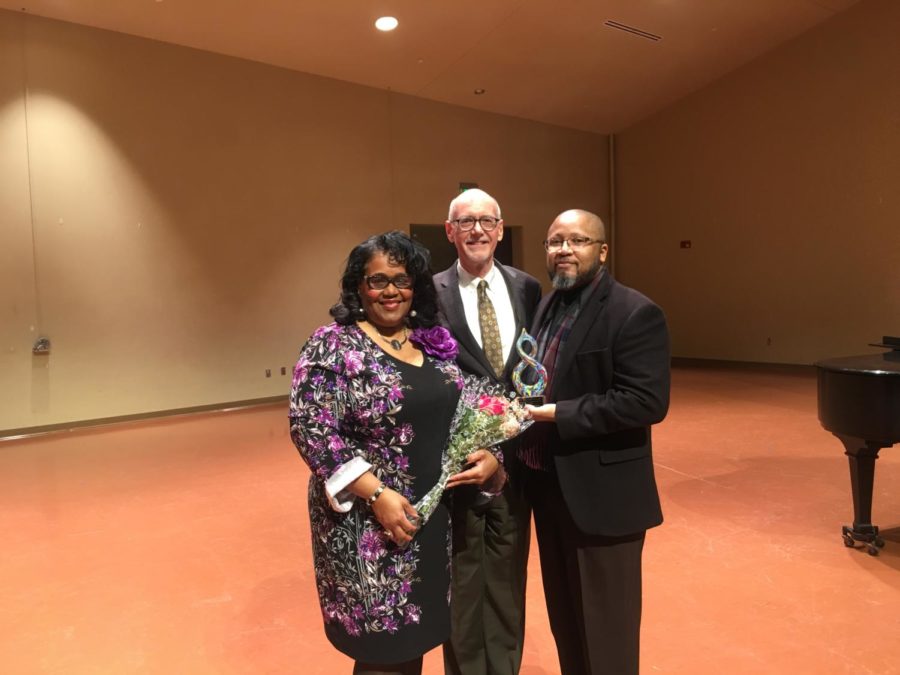Iowa State’s Reginald Stewart wins Ames Humanitarian Award
January 21, 2019
More than 400 parents, teachers and school children gathered Monday night in the Ames Middle School auditorium where students performed in honor of the late Martin Luther King Jr. The renowned civil rights leader would have turned 90 this month.
The celebration featured performances from Meeker Elementary School and the Ames High Step Team, an award ceremony and a speech from West Des Moines Council Rep. Renee Hardman.
Iowa State Vice President for Diversity and Inclusion Reginald Stewart received the Ames Humanitarian Award for his “extraordinary quality of commitment to the goals of inclusivity and equity,” said Joel Hochstein, the chair of the Ames Human Relations Commission.
Stewart founded the Ames Community Institute, which engages citizens of all demographics and promotes diversity of opinion.
“We do this work because we believe in change,” Stewart said. “More people than me should get this award, lots of people do good work, but it doesn’t get public focus. It’s very humbling to receive this award.”
Hardman shared her experiences watching King’s dream manifest in her lifetime and discussed areas where progress is still needed greatly.
“My life is what it is today because of his dream, his life and his legacy,” Hardman said. “I still sometimes reflect and ask myself, ‘Has his life been in vain? Did his dream ever come true?’”
She said she remembered asking herself that question on Jan. 20, 2009, when she joined the crowds in Washington D.C. to witness Barack Obama being sworn in as America’s first black president.
“I remember walking alongside my friend and saying, ‘I can’t believe I’m here!’” Hardman said. “I stood next to strangers with tears rolling down their faces. I remember being locked arm and arm with a man I had never met. I was almost overcome by the magnitude of what had just happened … and that was the moment I wondered if [King’s] dream had been fulfilled … and I naively thought it had.”
Hardman said it was easy to feel, in that moment, that King’s dream of a world where people are judged solely by their character, and not by their race, gender, religion or sexual orientation, had been realized. However, she went on to describe areas where she believes progress is still needed.
“While there’s been progress, the dream had not yet been filled,” Hardman said. “When we live in a society where less than 3 percent of Fortune 500 companies are run by minorities … where women are still paid considerably less than men for the same work, the dream has not been fulfilled.”
She also described her hardships running for public office in West Des Moines, where she became the first African American woman to be elected onto the city council.
“I encountered a man that looked at me when I opened the door and said, ‘You’re a colored woman, and West Des Moines doesn’t elect colored women to office,’” Hardman said. “I decided to thank him for his time and walk away from those steps, because I didn’t think my message would resonate.”
The altercation left her downtrodden, and she reached out to her mother for advice.
“I picked up my phone and called my mother, who raised three girls as a single mother in inner-city Chicago,” Hardman said. “I told her what happened, and my mom said, ‘Did he spit on you? Did he hose you down? Did he poor coffee on your face? That’s what happened to your ancestors. He only spoke words. ancestors dealt with so much more.’”
Hardman said that conversation reminded her that she stood on the shoulders of people who fought to end injustice, and that people like King had given the people of a chance to continue the fight for a more equitable world.
“He has taught us that darkness cannot drown out darkness, only light can,” Hardman said. “That hate cannot drive out hate, only love can. I hope we can all use Dr. King’s message, so that we might work miracles in the lives of those that choose to hate.”
Editor’s Note: The original article reported that Hardman is a City Council Rep. for Des Moines instead of West Des Moines, and that Stewart founded the Ames Community Commission instead of the Ames Community Institute. The Daily regrets these errors.







